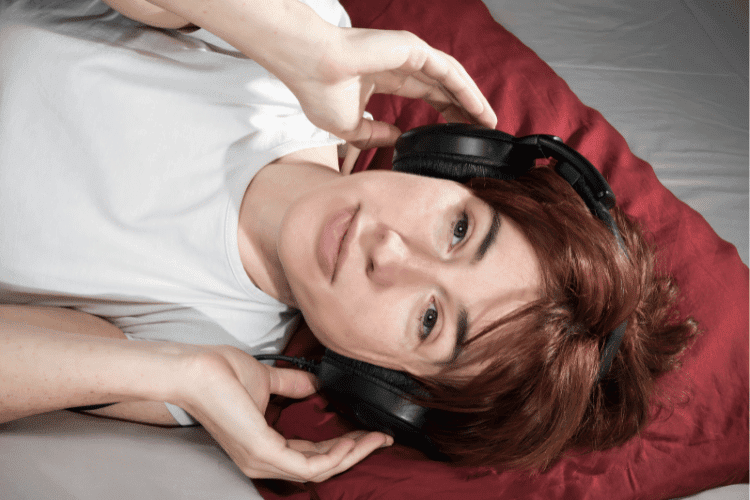Have you ever found yourself lying awake in bed, your mind racing with excitement about an upcoming event? Maybe it’s a vacation, a big celebration, or even just a fun day planned with friends. You’re thrilled and full of energy, but you need to sleep. How to Fall Asleep When You’re Excited?
The answer isn’t always straightforward, especially when you’re bubbling with joy and anticipation. But don’t worry; we’ve got you covered.
Excitement is a feeling we all love. It’s like a happy buzz inside us when we think about something great that’s going to happen. But sometimes, that happy buzz can be a little too loud when we’re trying to sleep.

Oh, the excitement! Maybe it’s the holiday tomorrow, a trip you’re taking, or some big news you’ve just got. Whatever it is, it’s making your heart beat a bit faster, your mind is racing, and your eyelids… well, they just refuse to stay shut. You’re lying in bed, tired, wanting to sleep, but just can’t. Sounds familiar, right?
We all love the feeling of being excited. It’s that joy, anticipation, and buzz that makes life so sweet. But when it’s time to hit the hay and your brain won’t shut off, it’s a problem. Sleep is important, and even if you’re buzzing with excitement, you need to find a way to get some shut-eye.
So, how do you calm the mind when you are too excited to get some sleep? Let’s explore some options…
Feeling excited at night isn’t unusual, and it often has clear reasons. Let’s explore some of the common factors that might contribute to this night-time excitement.
When there’s something exciting happening the next day, it’s natural to feel a surge of energy and anticipation. It might be a birthday, a holiday, or a job interview. This eagerness can create a lively feeling that makes it hard to settle down for the night.
Sometimes, our minds become most creative and inspired at night. You might find yourself brimming with ideas for a project, a gift, or even a new recipe. This burst of creativity can make you feel energized and excited.
If you’ve spent the evening with friends or family, laughing and having fun, that social joy can carry into the night. You might replay happy moments in your mind, feeling contentment and excitement long after the event has ended.

Deep breathing is more than just taking big breaths. It’s an exercise that can help the whole body relax. When excitement takes over, the mind becomes active, and deep breathing can be a solution to help unwind.
Deep breathing is a deliberate and mindful exercise that involves breathing in deeply through the nose, holding the breath for a few seconds, and then exhaling slowly through the mouth. This practice helps to engage the diaphragm and fill the lungs completely.
A warm bath or shower is more than a routine part of personal hygiene. It’s a calming ritual that many find not only enjoyable but also conducive to relaxation. Especially when excitement has your body buzzing with energy, a warm bath or shower can be a comforting transition to a more peaceful state. Here’s how it helps:
A warm bath or shower involves soaking or standing in warm water, sometimes with the addition of scented oils, bubbles, or bath salts. The warmth of the water combined with the gentle pressure of the shower head or the stillness of the bath creates a soothing experience (almost like being in the womb!). Unlike a cold shower which wakes you up and speeds up our heart rates, the warm water relaxes our muscles and slows the heart rate, which can give you the feeling of lethargy and sleepiness immediately after.
Reading a book, for many, is a daily habit or a favorite pastime. But did you know that it can also be a fantastic tool for calming down and preparing your mind for sleep? When excitement fills your thoughts, picking up a good book might be the key to unwinding and finding that peaceful state needed for restful slumber. Let’s explore how reading a book can help:
Reading a book involves engaging with a written text, usually for pleasure, learning, or both. Whether it’s a novel, a magazine, or even a comic, reading offers a mental escape, allowing you to enter different worlds and perspectives. It allows the mind to be taken on a journey and it also keeps you from starting into blue light, which has negative effects on sleep as well.
Herbal tea, a beloved beverage for many, goes beyond being a simple thirst-quencher. It can be an essential part of a bedtime ritual that helps ease the mind and body into a state of relaxation, especially when you are overcome with excitement or stress. There is a reason why so many people love a cup of tea before bed and how this soothing beverage can prepare you for a restful night:
Herbal tea is a type of tea made from various herbs, flowers, or plant parts other than traditional tea leaves. Common herbal teas like chamomile, lavender, and peppermint are all well-known for their calming effects that can help with sleep.
Sometimes, excitement can translate into a physical sensation, a kind of buzzing or restlessness in the body. When this happens, gentle exercise or stretching can be a powerful way to redirect that energy and promote relaxation. Here’s a closer look at this approach:
Listening to soft music or calming sounds is not just about entertainment; it can be a gateway to relaxation and tranquility. The right kind of auditory experience can envelop you in comfort and ease your mind into a state of restfulness. Let’s delve into this method:
Listening to soft music or calming sounds means choosing sounds that bring a sense of peace and calmness. It’s about selecting audio that resonates with relaxation for you, whether it’s a gentle piano melody, the sound of ocean waves, or the soft rustle of leaves.
Visualization, or mental imagery, is not just a fancy term for daydreaming. It’s a focused practice where you use your imagination to create calming and soothing images in your mind. It’s like taking your mind on a relaxing journey, away from the excitement that might be keeping you awake. Here’s how this method can become a part of your relaxation toolkit:
Visualization involves consciously directing your thoughts towards peaceful and calming images. It’s creating a mental scene that relaxes and comforts you, such as a quiet beach, a lush forest, or a warm, cozy room. It can take some practice, especially when your mind is racing, but if you can continue to bring yourself back to relaxing mental imagery when your mind is racing, you will eventually drift off to sleep from this practice.
Finding rest when excitement takes over isn’t always easy, but it’s far from impossible. Just like a good friend, sleep will be there for you if you invite it in with calm and patience. The simple steps and insights shared in this guide are designed to help you bridge the gap between joyous anticipation and peaceful slumber. It’s all about finding the right balance and letting yourself unwind in your own time.
Every great day starts with a good night’s sleep, even when the next day is filled with special moments. Sweet dreams, dear readers, and here’s to waking up refreshed and ready to enjoy all the excitement that awaits you